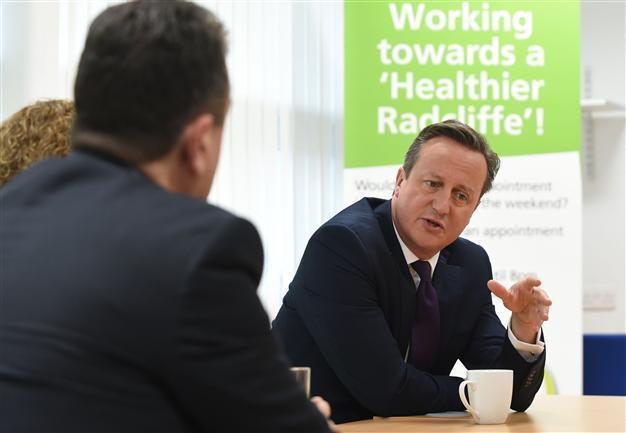Cameron refuses to rule out Brexit, says recasting EU ties hard work
MANCHESTER, England - Reuters

British Prime Minister David Cameron talks local doctors during a visit to the Radcliffe Primary Care Centre in Bury, Greater Manchester on October 4, 2015. AFP Photo
Prime Minister David Cameron said his renegotiation of Britain's ties with the European Union was "bloody hard work" and refused to rule out campaigning for a British exit in a referendum if other EU leaders failed to grant him the concessions he wants.
As his ruling Conservative Party gathered for an annual meeting, Cameron urged his party to be patient over Britain's relationship with Europe ahead of a vote on membership which he has promised by the end of 2017.
"If I don't get what I want then I rule nothing out," Cameron told BBC television when asked if he was prepared to lead Britain out of the bloc.
"But I am confident we will get what we need," he said in the northern English city of Manchester, where arguments over whether Britain's should remain an EU member have overshadowed domestic announcements such as paid time off for older workers to look after their grandchildren.
For at least a generation, Cameron's party has been riven by a conflict over Britain's relationship with Europe that contributed to the downfall of both Margaret Thatcher and John Major, the last two Conservative prime ministers.
When asked if Britain was drifting towards the EU exit, Cameron said: "I am trying to get for Britain the things that we need and obviously once I have got them I will turn around and make the case for staying in a reformed Europe."
Under pressure from lawmakers who feared the electoral success of the anti-EU UK Independence Party, Cameron in 2013 promised to hold a referendum, though UKIP won just one seat in this year's parliamentary election and Cameron won the first Conservative outright majority since 1992.
Thousands of protesters against spending cuts are expected to march past the Conservative conference and one opponent screamed "Tory scum" as members entered the venue.
In or out? While Cameron's majority gives him authority with many supporters, the risk he faces is that the Greek and migrant crises in Europe turn public opinion against membership just as arguments over Europe fracture his own party.
As many as one in five of his lawmakers is likely to vote to leave the EU, research from the Open Europe think tank showed, indicating the scale of the divide.
A British exit would shake the Union to its core by shunting the bloc's second largest economy away from a club it joined in 1973. Major investors and allies say a divorce would torpedo Britain's global clout and hurt London's financial powerhouse.
Both supporters and opponents of membership are launching campaigns and attracting financing, though opponents have two rival organisations.
Details on the course of Cameron's negotiations with European leaders including German Chancellor Angela Merkel are closely guarded but officials said details on the outline of a possible deal could be given in December.
"I'm confident I've got the right strategy," Cameron was quoted as saying by the Daily Telegraph. "I've just got to get on with it ... it's bloody hard work."
Cameron is demanding the EU allow Britain to cut benefits for EU migrants and allow London to prevent the application of euro zone rules that might hurt Britain, which Cameron says will never join the euro.
He said on Oct.4 that Britain did not want to be part of an "ever growing political union" and that member state parliaments should be able to jointly bloc proposed EU rules.
When asked about disputes within his party over Europe, Cameron said: "There are some people who want to leave the EU ... and there is nothing I am going to bring back that will satisfy those people."
Cameron has refused to give a date for the referendum but told the Telegraph newspaper that EU counterparts will have "plenty of time" to consider his requests.
Cameron, who has said he will not seek a third term in 2020, dodged a question from the BBC about whether a vote to leave would be a failure, saying it was a choice for voters.
Business minister Sajid Javid, seen as potential future candidate for the Conservative leadership, refused to say if he would want to leave the EU if Cameron failed in his renegotiation.
